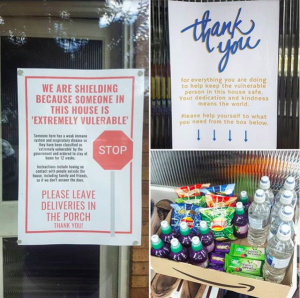
If you’re anything like me, these days of covid-19 are an emotional rollercoaster, and stress/anxiety-triggered symptoms are rearing their ugly heads. If you’re shielding, you may have the weight of 3 months stuck at home, all independence gone as you rely on others – friends, family and strangers – to meet basic needs like delivering food and medication. Delayed and cancelled appointments and treatments becoming harder to find just add to feelings of claustrophobia, loss of independence and insecurity. If you’re anything like me anyway…!
I’ve put together a few tips that I’ve been trying to live by to keep the days passing, and the negative emotions under control (without denying them).
Look after your mental health
For some of us, self-care from a mental health perspective is second nature, for others the demands of our physical needs have us out of practice paying attention to our emotional needs. During this time of fear, change and all-round heightened emotions, we need to touch base with those needs and create strategies for dealing with whatever comes up. What mental-health self-care looks like will differ between people but here are some useful resources:
Coronavirus Anxiety: Key Advice for Chronic Illness Patients from Health Psychologists
Looking after your mental health during the Coronavirus outbreak
How do we meet emotional needs while self-isolating or working from home?
Resources from MIND
Allow yourself to feel
At first, I thought I was the only one who felt like an emotional yo-yo, swinging from “I’ve totally got this” to “how am I ever going to get through this?”. But the more I talk to people, the more I realise this is something everyone is feeling – chronic illness sufferer or not.
Just at the right time, my friend Meg posted an IGTV video about how she had had a low day the day before, and how everyone around her had tried to make her feel better. But what she’d really needed was to listen to those feelings, recognising the fears and giving herself permission to feel them, because life is scary right now!
To deny or try to push away these completely understandable feelings of fear, insecurity and helplessness won’t help us to cope with them. We need to recognise them as completely understandable, a healthy reaction to these extreme circumstances. Only by giving them space to exist and accepting that they are a natural response can we hope to move past them to happier (or at least more stable) mental spaces. Read more from Meg.
Ask for help
I do not mean for the above section to skim over the overwhelming nature of the feelings we might have at the moment, and I want to stress that if things are getting too much, ask for help.
My amazing GP posted on Instagram about how the numbers of people she’s seeing with potential symptoms of cancer have dropped significantly since coronavirus hit. Just to be clear, this isn’t because coronavirus has cured or prevented cancer, it’s because people feel like they shouldn’t be asking for help from medical professionals right now.
If you need help, please, please ask for it. If you don’t feel you can approach your GP, there are local MIND groups, and national organisations like the Samaritans who can help. I’m not medically trained, nor do I have a qualification in counselling or emotional support, but I’m also always happy to listen if you ever need someone to offload to. Please reach out.
Samaritans
MIND
Drop me a line – email, Instagram @chronicallyawesomeellie
Do 5 things

Examples include:
- Put on a face mask – the sort that makes your skin nice, not the virus-blocking kind!
- Do some colouring
- Spend some time outside on a balcony or in the garden, wrapped in a blanket if needs be
- Hand-write a letter to someone
- Paint your nails
Restart your favourite book, podcast or TV show (right now I’ve gone back to the start of the Harry Potter audiobooks, Brooklyn 99 on TV and My Dad Wrote a Porno on the podcast app)
- Open a window and listen to the sounds of spring, feel the breeze on your face
- Take 5 big breaths that fill your lungs as much as you possibly can, releasing the tension that’s lurking between your ribs (sitting down if you’re prone to getting dizzy like me)
- Have a solo dance party when no-one is watching
Got more ideas? Let us know what you’re doing by tagging us on Instagram @chronically.awesome
Sometimes mindless > mindful
This is a subjective one, but in times of crisis, I sometimes choose to stop meditating. While mindfulness and meditation can be really powerful tools, sometimes meditation can turn into an opportunity to ponder how tough things are.
If you’re the sort of person who finds meditation the perfect tool for relaxing and letting go of what you no longer need, I find it can be the opposite. I sit quietly trying to listen to my body and letting thoughts come and go, but in reality all I’m doing is thinking about what bit(s) of me hurts and how heavy emotional burdens are sitting on my chest.
If you’re like me, that’s OK! Find something else that helps to ease tension and aids relaxation. That might be diving under your weighted blanket in bed with your fave guilty pleasure music on, it might be diving into a book or podcast, playing cards… anything that brings some mindlessness, ideally with a little stillness too.
Keep a routine, whatever that means for you
This one is often reserved for people who are working from home for the first time and are struggling to maintain a routine, but it applies to us too, even if our routines look different! A few days into shielding I re
alised that I’d missed several doses of meds (the middle of the days ones usually), I’d not been drinking enough fluids, and I’d been boredom eating way more than my body needs.
All of this stemmed from a sudden change of routine. Being at home for extended periods of time isn’t new for many of us, but having others around much more, and loosing the ability to get out and about can be strangely disrupting all the same.
Try to set yourself a new shielding routine. Little to-do lists for the day can be really powerful, even if it has things like “get dressed” and “cook dinner” on, they’ll still bring some forward momentum and a sense of achievement to your day.
Here’s a little secret: my shielding routine involves an alarm that doesn’t go off until 10am, but nonetheless wakes me up most mornings! At least I don’t sleep until the afternoon… right?!
Practice gratitude
A final one for today, gratitude. With such a reliance on others to see us through this crisis, it’s easy to focus on what we’re lacking – independence, security etc. I’ve been trying to flip that to focus on what I’ve got – a great support network, friendly neighbours, and a town filled with strangers who are happy to help me source whatever I need. It’s not just about #clapforcarers either, I’ve put a gratitude box in my front porch alongside my shielding poster, and I’ve been in touch with local businesses to see if I can give back with social media help or anything else I can do from home as a display of gratitude for the help they’ve given me and others in a similar position. Switching focus has been a really powerful tool in recognising what I’ve got right now, not what I don’t.


 Restart your favourite book, podcast or TV show (right now I’ve gone back to the start of the Harry Potter audiobooks, Brooklyn 99 on TV and My Dad Wrote a Porno on the podcast app)
Restart your favourite book, podcast or TV show (right now I’ve gone back to the start of the Harry Potter audiobooks, Brooklyn 99 on TV and My Dad Wrote a Porno on the podcast app)
